
Home - Search - Browse - Alphabetic Index: 0- 1- 2- 3- 4- 5- 6- 7- 8- 9
A- B- C- D- E- F- G- H- I- J- K- L- M- N- O- P- Q- R- S- T- U- V- W- X- Y- Z
DS2000
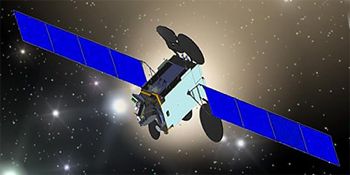 Eshail Credit: Manufacturer Image |
AKA: DRTS;Michibiki;MTSAT;QZS. Status: Operational 2002. First Launch: 2002-09-10. Last Launch: 2015-10-16. Number: 9 . Thrust: 500 N (110 lbf). Gross mass: 5,000 kg (11,000 lb). Height: 4.00 m (13.10 ft). Diameter: 4.00 m (13.10 ft). Span: 30.00 m (98.00 ft).
The DS2000 features a highly reliable design and production based upon experience derived from participation in more than 280 satellite projects. It was capable of providing an output of up to 15kW, satisfying the power requirements for powerful and multiple communications transponders. At the same time its flexible design matched a variety of applications including hybrid communications payloads.
Leading characteristics:
- Satellite Power Up to 15kW
- Launch Mass 5,000 kg
- Transponders 72 (nominal)
- Life 15yr
- Launch Vehicle Compatibility: H-2A, Ariane V, Delta IV, Atlas 5, Sea Launch
- Subsystems
- Electrical Power System: 100V regulated dual bus with high-efficiency silicon, multijunction GaAs solar array and NiH2 or Li-Ion batteries
- Onboard Control System: Attitude control, data handling and satellite management
- Attitude Control: Controlled bias momentum or zero momentum with satellite controller (SC) and four skew reaction wheels
- Telemetry Tracking & Command: 1553B interface with SC
- Structure: Carbon-fiber reinforced plastic, central cylinder type
- Thermal Control: Heat pipe embedded payload panel, OSR, blanket and heater
- Propulsion: Integrated Bi-propellant system with apogee and attitude control thrusters. Ion engine available on request.
More at: DS2000.
| MTSat 2 (Himawari 7) Null |
| Superbird 7 (Superbird C2) Null |
| QZS 1 (Michibiki 1) Null |
| ST 2 Communication satellite built by Mitsubishi Electric (MELCO) for Singapore Telecom (SingTel), Chunghwa Telecom, Singapore. Launched 2011. Used the DS-2000 bus. |
| Turksat 4A Communication satellite built by Mitsubishi Electric (MELCO) for Tnrksat AS, Turkey. Launched 2014. Used the DS-2000 bus. |
| Himawari 8, 9 Communication, Meteorology satellite built by Mitsubishi Electric (prime), Boeing for Japanese Ministry of Transport Civil Aviation Bureau & Meteorological Agency, Japan. Launched 2014 - 2016. Used the DS-2000 bus. Launched 2014-2016. |
| Turksat 4B Communication satellite built by Mitsubishi Electric (MELCO) for Tnrksat AS, Turkey. Launched 2015. Used the DS-2000 bus. |
| DSN 2 (Kirameki 2) Null |
| Es'hail 2 Communication, amateur communication satellite built by Mitsubishi Electric (MELCO) for Es'hailsat, AMSAT. Used the DS-2000 bus. |
| QZS 2, 4 (Michibiki 2, 4) Null |
| QZS 3 (Michibiki 3) Null |
| Superbird 8 (Superbird B3) / DSN 1 (Kirameki 1) Null |
Family: Communications, Earth, Navigation, Technology. Country: Japan. Launch Vehicles: Proton, H-II, Ariane 5, H-IIA, Proton-M/Briz-M, H-IIA 202, H-IIA 2024, Ariane 5ECA, H-IIA 204. Launch Sites: Baikonur LC81/24, Tanegashima, Kourou, Baikonur LC200/39, Tanegashima Y, Kourou ELA3. Agency: Mitsubishi. Bibliography: 2, 12244, 12245, 12246, 12247, 12248, 12249, 12250.
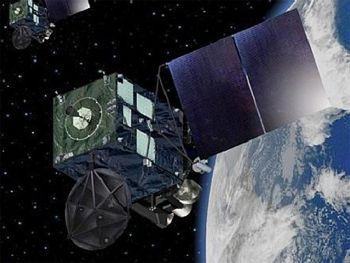 | Himawari-8 Credit: Manufacturer Image |
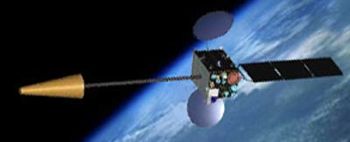 | MTSAT-2 Credit: Manufacturer Image |
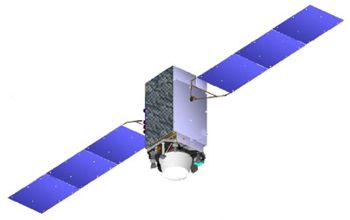 | Michibiki Credit: Manufacturer Image |
 | ST-2 Credit: Manufacturer Image |
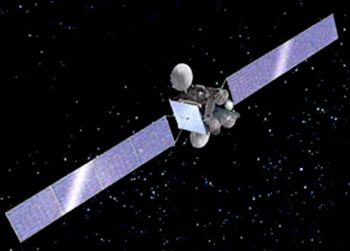 | Superbird 7 Credit: Manufacturer Image |
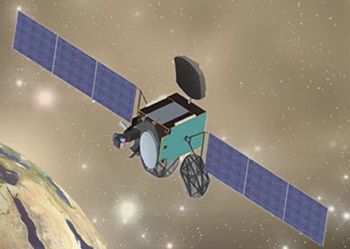 | Turksat-4A Credit: Manufacturer Image |
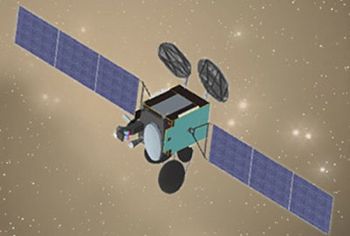 | Tnrksat 4B Credit: Manufacturer Image |
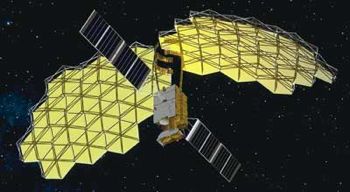 | Kiku 8 Credit: Manufacturer Image |
2002 September 10 - . 08:20 GMT - . Launch Site: Tanegashima. Launch Complex: Tanegashima Y. LV Family: H-2. Launch Vehicle: H-IIA 2024.
- Kodama - .
Payload: DRTS-W. Mass: 2,800 kg (6,100 lb). Nation: Japan.
Agency: NASDA.
Manufacturer: Mitsubishi.
Class: Communications.
Type: Civilian communications satellite. Spacecraft: DS2000.
USAF Sat Cat: 27516 . COSPAR: 2002-042B. Apogee: 35,804 km (22,247 mi). Perigee: 35,770 km (22,220 mi). Inclination: 0.00 deg. Period: 1,436.10 min.
Launch delayed from August 2002. First operational flight of H-2A booster. DRTS (Data Relay Transponder Satellite) was a Japanese geostationary communications spacecraft which was to relay images and data procured by the to-be-launched ADEOS 2 and ALOS satellites, and the KIBO module on ISS, after being parked over 90° E. However the engine failed after a couple of burns. As of 2007 Mar 11 located at 90.76E drifting at 0.005W degrees per day.
2006 February 18 - . 06:27 GMT - . Launch Site: Tanegashima. Launch Complex: Tanegashima Y. LV Family: H-2. Launch Vehicle: H-IIA 2024.
- MTSAT-2 - .
Payload: MT-Sat 2. Mass: 3,000 kg (6,600 lb). Nation: Japan.
Agency: MLIT.
Manufacturer: Mitsubishi.
Class: Earth.
Type: Weather satellite. Spacecraft: DS2000.
USAF Sat Cat: 28937 . COSPAR: 2006-004A. Apogee: 35,803 km (22,246 mi). Perigee: 35,771 km (22,227 mi). Inclination: 0.00 deg. Period: 1,436.10 min.
Multifunctional Transport Satellite. An aeronautical payload provided communications relay between aircraft and air traffic control; GPS augmentation navigation for aircraft; and transmitted the location of aircraft to air traffic control. A Japan Advanced Meteorological Imager weather camera had one visible and four infrared channels. MTSAT-2 was built by Mitsubishi using the new DS2000 bus. As of 2007 Mar 8 located at 144.93E drifting at 0.016W degrees per day.
2006 December 16 - . 06:32 GMT - . Launch Site: Tanegashima. Launch Complex: Tanegashima Y. LV Family: H-2. Launch Vehicle: H-IIA 204.
- Kiku 8 - .
Payload: ETS-8. Mass: 5,817 kg (12,824 lb). Nation: Japan.
Agency: JAXA.
Manufacturer: Melco.
Class: Technology.
Type: Navigation technology satellite. Spacecraft: DS2000.
USAF Sat Cat: 29656 . COSPAR: 2006-059A. Apogee: 35,798 km (22,243 mi). Perigee: 35,775 km (22,229 mi). Inclination: 0.0500 deg. Period: 1,436.11 min.
Engineering Test Satellite-8 was a Japanese prototype/operational demonstration for a number of new technologies: a large satellite bus, large-scale deployable 40-m-span antennae, mobile satellite communications system, mobile satellite digital multimedia broadcasting, and basic positioning using high-accuracy time standard devices. It will be positioned in geosynchronous orbit at 146 degrees East. JAXA developed two portable terrestrial systems to communicate directly with the satellite - a tiny telephone and a portable laptop computer. The satellite was to have a lifetime of ten years. As of 2007 Mar 11 located at 145.97E drifting at 0.010W degrees per day.
2008 August 14 - . 20:44 GMT - . Launch Site: Kourou. Launch Complex: Kourou ELA3. LV Family: Ariane 5. Launch Vehicle: Ariane 5ECA.
- Superbird 7 - . Mass: 4,820 kg (10,620 lb). Nation: Japan. Agency: Arianespace. Program: Superbird. Class: Communications. Type: Civilian communications satellite. Spacecraft: DS2000. USAF Sat Cat: 33274 . COSPAR: 2008-038A. Apogee: 35,804 km (22,247 mi). Perigee: 35,770 km (22,220 mi). Inclination: 0.10 deg. Period: 1,436.10 min. Ku-band Mitsubishi Electric DS2000 class satellite for Japanese television broadcasting..
2010 September 11 - . 11:17 GMT - . Launch Site: Tanegashima. LV Family: H-2. Launch Vehicle: H-IIA 202.
- Michibiki - .
Payload: QZS-1. Mass: 4,100 kg (9,000 lb). Nation: Japan.
Agency: Mitsubishi.
Class: Navigation.
Type: Navigation satellite. Spacecraft: DS2000.
USAF Sat Cat: 37158 . COSPAR: 2010-045A. Apogee: 38,944 km (24,198 mi). Perigee: 32,632 km (20,276 mi). Inclination: 40.90 deg. Period: 1,436.20 min.
Quasi-Zenith Satellite System; carried an L-band navigation package to augment GPS and a C-band transponder for communications. Placed in an inclined geosynchronous orbit that brings nearly overhead of Japan at peak usage hours, providing a better navigation and communications signal to users which normally would have equatorial geosynchronous satellite and medium-earth-orbit navigation satellite signals interfered with by tall buildings or steep canyons.
2011 May 20 - . 20:38 GMT - . Launch Site: Kourou. Launch Complex: Kourou ELA3. LV Family: Ariane 5. Launch Vehicle: Ariane 5ECA.
- ST-2 - . Mass: 5,090 kg (11,220 lb). Nation: Japan. Program: Singapore, Taiwan. Class: Communications. Type: Civilian communications satellite. Spacecraft: DS2000. USAF Sat Cat: 37606 . COSPAR: 2011-022B. Apogee: 35,793 km (22,240 mi). Perigee: 35,781 km (22,233 mi). Inclination: 0.00 deg. Period: 1,436.10 min. Singapore-Taiwan 2 communications satellite with both C and Ku band transmitters..
2014 February 14 - . 21:09 GMT - . Launch Site: Baikonur. Launch Complex: Baikonur LC81/24. LV Family: Proton. Launch Vehicle: Proton-M/Briz-M.
- Turksat-4A - . Mass: 4,850 kg (10,690 lb). Nation: Turkey. Class: Communications. Type: Communications satellite. Spacecraft: DS2000. USAF Sat Cat: 39522 . COSPAR: 2014-007A. Apogee: 35,790 km (22,230 mi). Perigee: 35,784 km (22,235 mi). Inclination: 0.0600 deg. Period: 1,436.12 min. Positioned at 42 deg E, provided Ku-band direct TV broadcasting channels and C- and Ka-band communications channels..
2014 October 7 - . 05:16 GMT - . Launch Site: Tanegashima. LV Family: H-2. Launch Vehicle: H-IIA.
- Himawari-8 - . Mass: 3,500 kg (7,700 lb). Nation: Japan. Class: Earth. Type: Weather satellite. Spacecraft: DS2000. USAF Sat Cat: 40267 . COSPAR: 2014-060A. Apogee: 35,791 km (22,239 mi). Perigee: 35,782 km (22,233 mi). Inclination: 0.0200 deg. Period: 1,436.08 min. Japan Meteorological Agency weather satellite. Stationed in geosynchronous orbit at 141 deg east..
2015 October 16 - . 20:40 GMT - . Launch Site: Baikonur. Launch Complex: Baikonur LC200/39. LV Family: Proton. Launch Vehicle: Proton-M/Briz-M.
- Turksat 4B - . Mass: 4,924 kg (10,855 lb). Nation: Turkey. Manufacturer: Mitsubishi. Class: Communications. Type: Communications satellite. Spacecraft: DS2000. USAF Sat Cat: 40984 . COSPAR: 2015-060A. Apogee: 35,793 km (22,240 mi). Perigee: 35,776 km (22,230 mi). Inclination: 0.0100 deg. Period: 1,436.00 min. Second Turksat-4 satellite for Turk Telecom with C, Ku and Ka-band communications payloads.Located at 50 E..
2016 November 2 - . 06:20 GMT - . Launch Site: Tanegashima. Launch Complex: Tanegashima Y. LV Family: H-2. Launch Vehicle: H-IIA 202.
- Himawari 9 - . Nation: Japan. Class: Earth. Type: Weather satellite. Spacecraft: DS2000. USAF Sat Cat: 41836 . COSPAR: 2016-064A. Apogee: 35,857 km (22,280 mi). Perigee: 243 km (150 mi). Inclination: 22.40 deg. Himawari 9 weather satellite was launched to geotransfer orbit by H-IIA-31. By Nov 8 the satellite was on station in GEO at 140.8E..
Back to top of page
Home - Search - Browse - Alphabetic Index: 0- 1- 2- 3- 4- 5- 6- 7- 8- 9
A- B- C- D- E- F- G- H- I- J- K- L- M- N- O- P- Q- R- S- T- U- V- W- X- Y- Z
© 1997-2019 Mark Wade - Contact
© / Conditions for Use